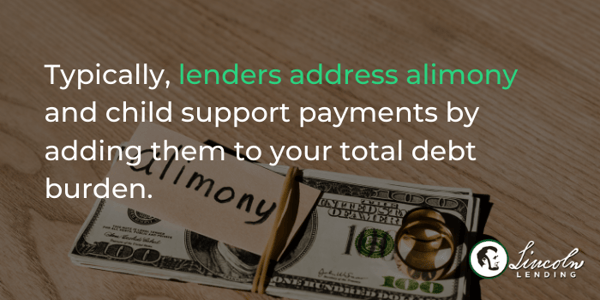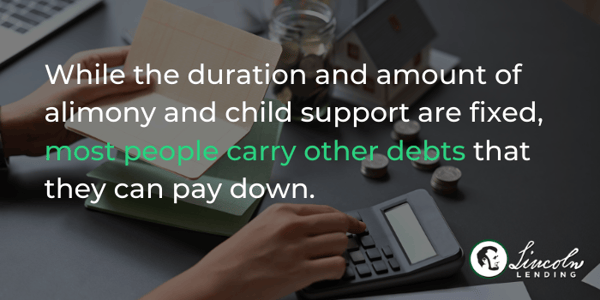Alimony and child support are court-ordered payments of a fixed duration. In both cases, these payments may continue for years, creating a significant impact on both the payer and recipient’s financial situations.
And the totals can add up quickly.
According to research, in 2017, roughly 33 billion dollars in child support was paid for more than 15 million children in the United States. For those who receive these payments, alimony and child support payments can qualify as income, which may be considered on loan applications, such as those for cars and homes.
Conversely, the payments often qualify as debt for the payer, which may cause lenders to view these individuals as “high risk.”
But what if you are in the market to buy a home? There is some good news. There are strategies to help offset the impact of alimony or child support payments on your mortgage application, helping you qualify for a favorable interest rate, and achieve your dream of homeownership.
How do Child Support and Alimony Affect Mortgage Applications?
Child support and alimony payments, sometimes referred to as maintenance payments, can have a negative impact on a mortgage application. Since these expenses are mandatory, it means that you have a pre-existing obligation. Just like a car payment or other contractual obligation, it’s one that lenders consider.
Typically, lenders address alimony and child support payments by adding them to your total debt burden. This is important because, just like your credit score and down payment are part of the mortgage approval calculation, so is the amount of debt you carry.

This does not mean that you cannot purchase a home while paying alimony and child support. But it does mean that you will have to be mindful of your debt-to-income ratio and make financial adjustments to increase your mortgage application viability.
How Does Debt-to-Income Ratio Impact Interest Rates?
If lenders see your credit score as a long-term picture of your financial habits, then debt-to-income (DTI) ratio is a snapshot of your capacity to take on new expenses.
Debt-to-income ratio is calculated by adding up your mandatory monthly expenses, such as car payments, child support, rent, etc. The total of those expenses is then divided by your monthly income, before taxes, to get your DTI.
Most conventional mortgage lenders see a debt-to-income ratio of 43% or lower as an indication that you can assume additional debt. However, a lender’s perception of debt-to-income ratio is not black and white. For example, just because a borrower’s debt-to-income ratio is slightly better than 43% doesn’t mean it’s “good.”
Debt-to-income ratio is an assessment of risk, since those with less financial flexibility may be more likely to miss a payment. Therefore, a DTI ratio of 40% may qualify for a mortgage loan, but it may receive a higher interest rate than a DTI ratio of 30%
But exactly how much will it impact your interest rate?
That’s hard to say.
While debt-to-income ratio is very important for the success of your mortgage application, and your ability to attract desirable loan terms, your credit score and down payment are also important. This can be good news because, if your debt-to-income ratio is not ideal, there are steps you can take to improve the success of your mortgage application.
Four Strategies to Improve Your Mortgage Loan Success
Remember, the stronger your overall financial situation, the better mortgage terms you will likely receive. Consider the strategies below to receive a more desirable interest rate for your loan.
Pay Down Your Debts
While the duration and amount of alimony and child support are fixed, most people carry other debts that they can pay down. For example, the average American carries a credit card balance of over $6,200.

While paying off such a debt can be a challenge for many working adults, research suggests that the typical household spends $3,000 a year dining out and $2,482 on entertainment. Paying down school and car loans will also have an impact on your financial viability.
Although it may not be fun in the moment, reducing your discretionary spending to pay down your debt will have an immediate impact on your credit score, debt-to-income ratio, and your mortgage interest rate.
Increase Your Income
It may sound obvious, but while we often discuss the debt side of the debt-to-income ratio, improving the income portion can make a big difference, as well.
Ideally, people use this strategy in conjunction with paying down their debt for an added boost. But either way, more income will improve your percentage of debt-to-income.
Keep in mind that your mortgage lender will be considering the reliability of supplemental income streams. So, while short-term, “side hustle,” money is great for paying off bills, your lender may not see it as a reliable income source. However, asking for a raise at work or establishing a side job for several months or longer (to demonstrate its legitimacy) will make a difference to your mortgage application and interest rate.
Consider a Cosigner
Allow us to start by saying that this is not necessarily an ideal strategy for everyone.
A cosigner is someone, typically a relative or domestic partner, who assumes equal responsibility for paying the mortgage. Since their income, and possibly their credit score, will be considered in the mortgage calculations, their willingness to co-sign significantly increases your financial position.
However, because they share 100% legal responsibility for paying the mortgage should you fail to do so, this can be a heartbreaking way to damage a relationship, as well as the credit score of someone you love.
If you choose to have a cosigner, think carefully about the risks, not only for yourself but also for the trusted individual who shares your burden.
Level Up Your Down Payment
One of the best and most dramatic ways to reduce your interest rate, and qualify for a larger mortgage loan, is to increase your down payment.

This is effective because, when you seek a mortgage loan, you are only asking for the difference between the cost of the home and your down payment. For example, if you have a $10,000 down payment for a $200,000 home, your mortgage payment may be over $1,000 a month.
But, if you have a down payment of $25,000, your monthly payments may be lowered by roughly $100 or more.
And while that may not seem like that much savings, when your mortgage lender considers what you can afford each month, that money will reduce the perceived risk of your request, and lower your interest rate accordingly.
Admittedly, it is not always easy to increase your down payment, and you may have to wait a little longer while you build up your savings. That said, when you consider that a good interest rate can save you tens of thousands of dollars over the life of the mortgage, the time spent is a wise investment.
Not Sure Which Strategy is Right For You?
Figuring out how to qualify for a mortgage can be overwhelming. If you’re ready to take control of your financial future, set up a free, no-obligation Home Loan Coaching Session with one of our Loan Officers. We’ll help you understand your current eligibility and create a plan for improving your credit score, DTI, or other factors so that you can qualify for the best loan possible.
